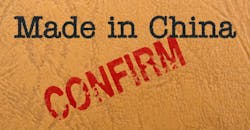Manufacturers’ Group Pushes for Country-of-Origin Labeling, and Amazon Pushes Back
Opinion/Analysis
Amazon has been in the news of late due to concerns over its workplace conditions. But Americans now have another reason to be apprehensive about Amazon and other e-commerce giants. These companies are actively lobbying against legislation that would require country-of-origin labeling (COOL) for any product sold on the Internet. The legislation is intended to help consumers make more informed choices when shopping online.
At issue is U.S. Sen. Tammy Baldwin’s (D-WI) COOL Online Act, which would mandate prominent country-of-origin labeling in all e-commerce product descriptions. Such labeling could help Americans find out exactly what they’re buying online, particularly if they’re aiming to buy American-made goods—or avoid purchasing products made in China.
Baldwin’s COOL Online Act easily passed the Senate Committee on Commerce, Science, and Transportation last month with bipartisan support. Now, however, an assortment of large online retailers represented by the National Retail Federation and Amazon is attempting to remove Baldwin’s legislation from moving forward as part of wider Senate legislation, the Endless Frontier Act (S.1260).
Why would these importers oppose efforts to stamp a clear “Made in China” or “Made in USA” label on product listings? Because they continue to rake in record profits by selling a multitude of cheap goods from Chinese factories. It’s estimated that 75 percent of all new goods being sold on Amazon come from China. To make matters worse, recent changes in U.S. Customs policy, known as de minimis express entry, allow Chinese goods priced as high as $799 to enter the U.S. duty-free.
China figures prominently in the need for country-of-origin labeling. Its products are subject to recalls at a disproportionately higher rate than other products. The Consumer Product Safety Commission (CPSC) maintains a running list of thousands of defective and unsafe Chinese imports entering the U.S. market. Such safety issues make news frequently, including last month’s announcement of Amazon’s liability for a defective Chinese hoverboard that caught fire in a California home.
It should be a no-brainer to give consumers the information they need to make good choices. Yet those opposing the COOL Online act are actually fighting to prevent Americans from having access to clearly labeled information on where e-commerce products are made. Meanwhile, as Chinese manufacturers continue to crank out a steady stream of shoddy products, they show no interest in redirecting their sales toward safer, American-made alternatives. Instead, they simply want to continue the status quo.
In response, a coalition of domestic U.S. manufacturers is urging support for Sen. Baldwin’s legislation. The Coalition for a Prosperous America (CPA), the National Council of Textile Organizations (NCTO), the International Brotherhood of Teamsters, the Manufacturers Association of Central New York (MACNY) and the Alliance for American Manufacturing (AAM) have sent a joint letter to Members of the U.S. Senate urging them to pass Sen. Baldwin’s COOL Online Act.
In the run-up to a vote on the bill, the Coalition for a Prosperous America has also launched an online petition drive to collect signatures from concerned business groups and consumers.
Retail giants have fought country-of-origin labeling efforts for years. That’s a shameful and self-serving agenda, and it must end. Companies like mine—that work hard to manufacture safe, quality products—are only asking for a level playing field in the e-commerce arena. Consumers want to know what they’re buying online, and where it was produced. It’s time to allow consumers to make a fair choice.
Ensuring proper online product labeling is a necessary step to prevent unsafe goods from entering the U.S. market. We hope the full Senate will reject any efforts by special interests groups to block Baldwin’s COOL legislation.
Greg Owens is co-chair of the Coalition for a Prosperous America’s (CPA) Buy American Committee and CEO of a mid-sized manufacturing company.
